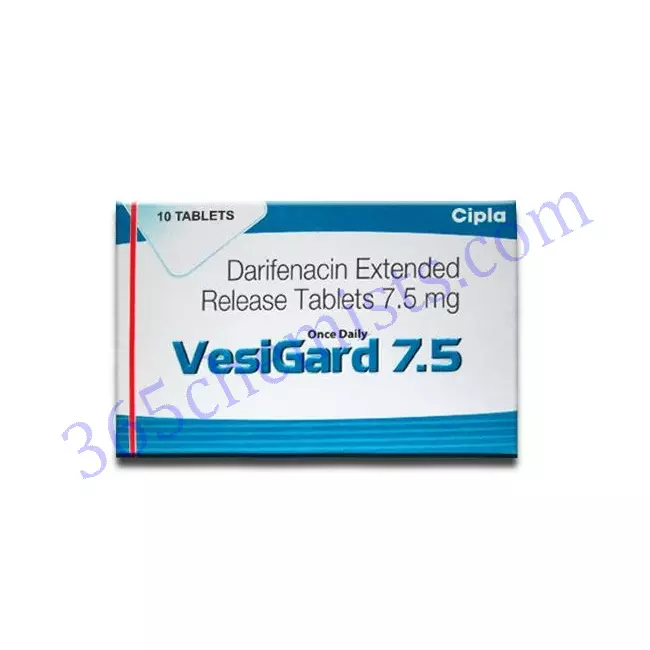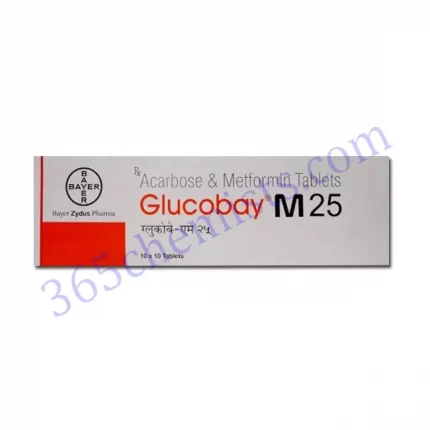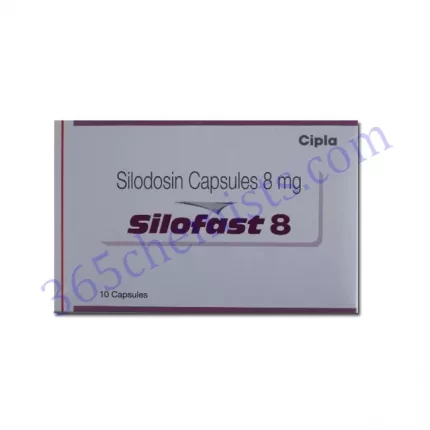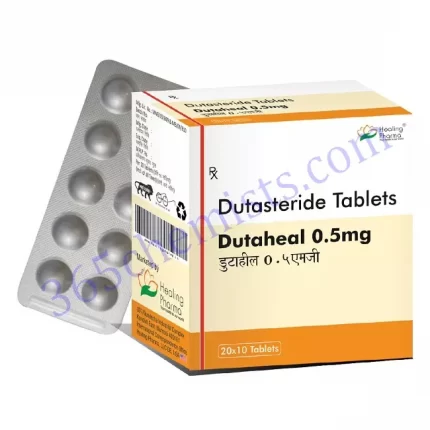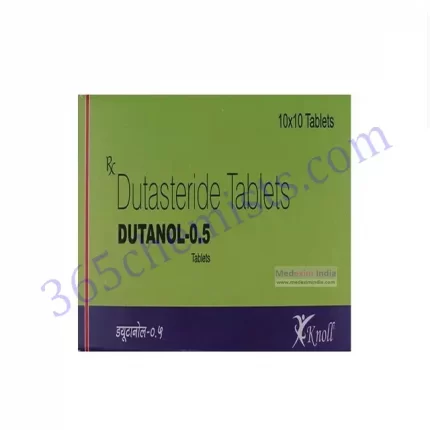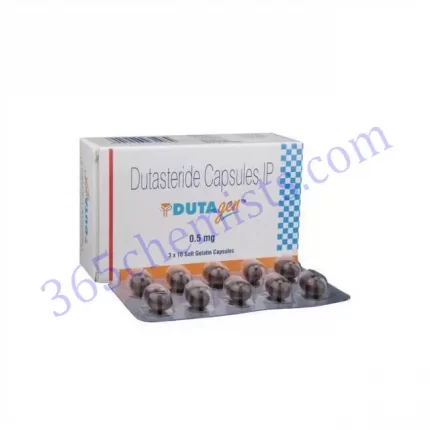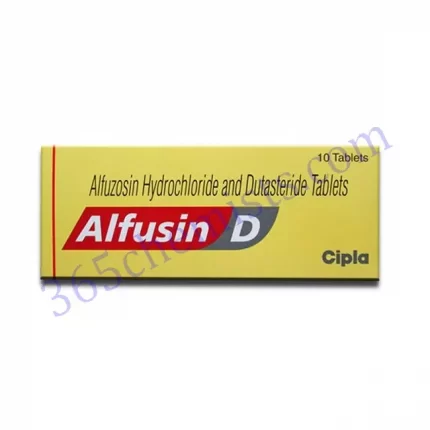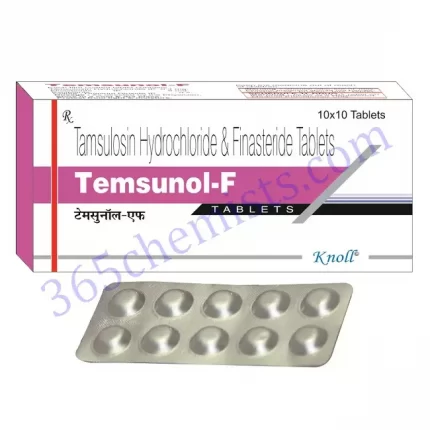Introduction and Overview
Darifenacin, the active component of Vesigard 7.5mg Tablet, is a member of the antimuscarinic drug class. It is typically used to treat overactive bladder (OAB) symptoms include incontinence, frequency, and urgency in the urine. Vesigard improves bladder control by lowering bladder contractions and relaxing the bladder’s muscles.
How Does Vesigard Work?
The bladder’s smooth muscle’s M3 muscarinic receptors are specifically blocked by Vesigard 7.5mg Tablets. Acetylcholine, a neurotransmitter that triggers bladder contractions, cannot bind as a result. helps lessen the urgency, frequency, and incontinence of urination brought on by an overactive bladder by suppressing these contractions.
Dosage and Administration
Vesigard7.5mg Tablet is best taken once day, with or without meals, and the suggested dosage is one tablet. Without chewing or crushing the tablet, it is crucial to consume it whole. Regarding the length of the course of therapy and any other recommendations unique to your illness, pay attention to the advice given by your healthcare professional.
Precautions and Warnings
Prior to using Vesigard 7.5mg Tablet, it is crucial to take the following safety measures into account:
- Allergies: Before beginning the drug, let your doctor know if you have a known allergy to Darifenacin or any other component of the pill.
- Vesigard should be used with caution in patients who already have urine retention or stomach retention since it may make these symptoms worse. It is crucial to go over your medical history with your doctor before deciding whether Vesigard is a good fit for your particular situation.
- Vesigard should be used with caution in people who have narrow-angle glaucoma because it can increase intraocular pressure. Before beginning Vesigard, discuss your medical history with your eye doctor.
- Vesigard’s elimination from the body may occur more slowly in people with liver or kidney dysfunction. The dosage may need to be changed, and your doctor should keep a careful eye on how you’re responding to the medicine.
Possible Side Effects
Some people may experience negative effects from taking Vesigard 7.5mg Tablet. Darifenacin’s frequent adverse effects include:
- mouth ache
- Constipation
- distorted vision
- urinary incontinence
- Headache
- Dizziness
Notify your healthcare practitioner if these side effects continue or get worse so they can be evaluated and treated further.
Additional Considerations
Here are some extra factors to take into account when using Vesigard7.5mg Tablet in addition to the information already mentioned:
- Timing of Administration: To keep a constant level of the drug in your body, it is advised to take Vesigard 7.5mg Tablet at the same time every day. This may enhance its capacity to control the symptoms of overactive bladder.
- Missed Dose: If you unintentionally forget to take your Vesigard, do so right away. Nevertheless, omit the missed dose and carry on with your regular dosing schedule if it is almost time for your next scheduled dose. To make up for a missing dose, do not take a second one.
- Regular Follow-up: To track your response to Vesigard and evaluate any side effects, it’s crucial to schedule frequent follow-up visits with your healthcare physician. Depending on your particular needs, they might change the dosage or provide other recommendations.
- Lifestyle Changes: In addition to medication, some lifestyle changes can help manage the symptoms of an overactive bladder. Some of these include keeping a healthy weight, using bladder training techniques, and avoiding triggers (such caffeine and alcohol) that exacerbate symptoms. For individualised advice, talk about these lifestyle modifications with your healthcare professional.
- Long-term Use: To treat their symptoms of overactive bladder, some people may need to take Vesigard 7.5mg Tablet on a regular basis. To maintain the medicine’s effectiveness and keep an eye out for any potential side effects or difficulties, it’s crucial to take the prescription as directed and schedule routine checkups with your healthcare practitioner.
Frequently Asked Questions (FAQs)
The following are some typical inquiries concerning Vesigard7.5mg Tablet:
How long does it take Vesigard to begin functioning?
A: Everybody reacts differently to situations. After taking Vesigard for a few weeks, some people may experience relief from the symptoms of overactive bladder, while others could need more time. It’s crucial to adhere to your doctor’s directions and schedule frequent follow-up sessions so you can see how you’re doing.
A2: Can children or adolescents take Vesigard?
Vesigard is not advised for usage in kids or teenagers. Vesigard’s effectiveness and safety in this age range have not been shown.
A3: Can Vesigard interact negatively with other drugs?
A number of medications, including various anticholinergic agents and specific antibiotics, may interact with vesigard. To prevent potential interactions, tell your healthcare provider about every drug, dietary supplement, and herbal product you use. Possible drug interactions can be discussed with your doctor or chemist.
Q4: Can Vesigard be taken while nursing or while pregnant?
A: Vesigard should be administered with caution to expectant mothers and nursing mothers. If you are pregnant or breastfeeding, it’s crucial to go over the potential dangers and benefits with your doctor before starting .
Q5: Can people with liver or kidney issues use Vesigard?
A: People with liver or kidney damage should use Vesigard with caution. The dosage may need to be changed, and your doctor should keep a careful eye on how you’re responding to the medicine.
Conclusion
Overactive bladder (OAB) symptoms are frequently treated with Vesigard7.5mg Tablet, which contains Darifenacin. Vesigard aids in lowering OAB-related urine urgency, frequency, and incontinence by inhibiting the M3 muscarinic receptors in the bladder. It is crucial to take the medication as directed, to take safety measures, and to notify your doctor of any side effects or concerns. Vesigard can be a successful therapy choice for people with overactive bladder when used properly and monitored. For personalised counsel and direction tailored to your unique requirements and circumstances, always seek the opinion of a healthcare expert.

